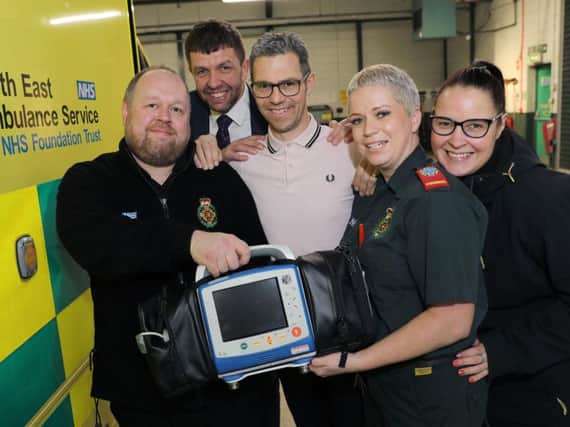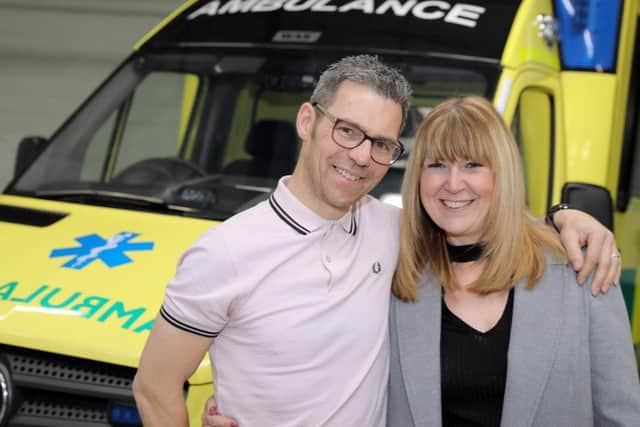Heroes save life of cyclist dad after he collapses in race


Ray Honour was competing in an event at South Shields Velodrome when he collapsed just as he started the last lap of a veterans’ race.
Heather Huntley and Damon Devine were both watching the event at the time and came to Ray’s aid, calling 999, beginning CPR and mouth-to-mouth resuscitation and calling for someone to collect the community defibrillator.


The defibrillator was used to give Ray several shocks.
Advertisement
Hide AdAdvertisement
Hide AdNorth East Ambulance Service call handler Gary Mayne dispatched an ambulance on blue lights to the address and talked those helping him through the situation.
Damon, had never given CPR before, but managed to perform the action upon Ray, who was taken to South Tyneside District Hospital and then the Freeman Hospital in Newcastle with his daughter Rebecca by his side.
It’s only after the incident that Ray, who works as an electronics operator at ZF in Peterlee, found out that there were hereditary heart problems on both sides of his family.
Joined by his wife Joanne and mum Joan, 47-year-old cycling enthusiast Ray Honour, from Fleetham Close in Chester-le-Street, reunited with the team who helped to save his life to say thank you recently.
Advertisement
Hide AdAdvertisement
Hide AdHe explained: “It’s unbelievable what people did for me on the day.
"I have made such a good recovery, I probably feel as fit if not fitter than before.
" I’m on the right medication and my heart is better.
“I can’t really remember anything of the actual incident.
"All I remember was that I was doing quite well in the race – leading in my category. I came round and started the last lap.
"The next thing I remember was being in the back of the ambulance. I’m so grateful to everyone for what they did for me that day.”
Advertisement
Hide AdAdvertisement
Hide AdRecalling the incident Damon said: “The race was on the last lap when I heard a shout for assistance.
"A man was on the floor; he was no longer breathing and we couldn’t find a pulse.
"Heather was fantastic at giving instructions.
"She is first aid trained and told me exactly what to do.
"We gave Ray a number of shocks with the defibrillator.
"It was an amazing piece of kit – it just told us what to do all the way through it.”
Rapid response paramedic Clare Edmonds was part of the North East Ambulance Service team that were sent to the incident.
Advertisement
Hide AdAdvertisement
Hide AdShe helped to get Ray’s heart started and helped transport him to hospital following the incident in December last year.
“We can help to revive the heart once we get to a patient in Ray’s condition, but without early CPR and defibrillation, he could have suffered cerebral damage that would have made a difference to his future quality of life," she said.
“Heather and Damon’s actions helped to ensure that Ray had the best chances for a full recovery.
"If there hadn’t been a defibrillator in the community and if the people at the event hadn’t used CPR, Ray might not have had the same chances to be here with us all. "
Advertisement
Hide AdAdvertisement
Hide AdRay has since had three heart stents an internal defibrillator fitted, has had to give up his driving licence for six months and is taking a break from cycle racing – after which he’ll talk to his family and doctors and then decide whether he’ll race again.
For now, he’s already back in the saddle to cycle to work in Peterlee.
In a bid to increase the number of defibrillators in the community, NEAS recently launched a campaign to raise awareness of their value and to offer funding from its charitable trust in key areas.
Community development officer at NEAS, Alex Mason, said: “When a heart stops beating, oxygen is not being transported to the brain and other vital organs, and within four to five minutes, brain damage will start to occur without intervention.
Advertisement
Hide AdAdvertisement
Hide Ad"A victim’s chance of survival falls by around 7 to 10% with every minute that defibrillation is delayed.
“Evidence suggests that over a quarter of adults living in the North East currently wouldn’t perform CPR or use defibrillator for fear that they might hurt the person or do it wrong.
"Only 8.7% of patients who had resuscitation attempted on them in the North East survived to be discharged from hospital last year.”
To find out more about community defibrillators, find your nearest and apply for funding for one, visit: /our-services/community-defibrillators/funding-opportunities.aspx
If you want to donate to the Charitable Fund, please follow this link: https://mydonate.bt.com/charities/northeastambulanceservicetrustfund